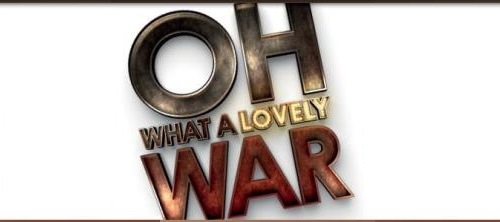Oh! What A Lovely War summarises and comments on the story of World War One, strongly using popular songs of the time. Many of these songs are much older popular songs that have been sarcastically re-worded by the soldiers serving on the front lines.
The film uses a variety of symbolic settings to portray vast summations of historical and societal forces at work. Brighton's West Pier, as a location, represents the First World War, with the British public entering at the turnstiles, and General Haig selling tickets. The protagonists are named as the Smith family; which serve as allegorical representations of the working and middle classes of the nation. The film follows several young Smith men through their experiences in the trenches, most notably Freddy, Harry and George.
The opening sequence is set in a wrought-iron building intended to not look like a real location. This use of Brechtian staging illustrates the ruling class' fundamental disconnect from the realities of war as diplomatic farces, galas, and events involving the aristocracies of many European nations are shown only in this location throughout the film. As various diplomats and aristocrats walk over a huge map of Europe summarising the treaties, nationalism, and lust for expanding empire that were factors leading to the war, the scene ends with a group photo of the upper class being taken by an unnamed photographer. He hands out two red poppies to the Archduke Ferdinand and his wife and takes a picture. As the flash goes off, they fall over dead as he declares they have been assassinated.
The start of the war in 1914 is shown as a parade of optimism. A band playing patriotic music rouses citizens lounging by the beach to rally round it and follow it - some even boarding a bandwagon. They are led to the idea of war, illustrated on film as a the cheerful seaside carnival on Brighton West Pier. The first Battle of Mons is similarly cheerfully depicted yet more realistic in portrayal. Both scenes are flooded in pleasant sunshine. When the casualties start to mount, a shocked theatre audience is rallied by singing "Are We Downhearted? No!", a song which attempts to express the English psyche of the moment: "While we have Jack upon the sea/And Tommy on the land/We needn't fret".
The curtains on the stage lift to reveal several attractive young women dressed in frilled yellow dresses who recruit a volunteer army. They appeal to the patriotism of the crowd in the 'Roedean' section, singing "We Don't Want To Lose You, But We Think You Ought To Go." Maggie Smith then enters a lone spotlight as the curtain is drawn, and lures the roused but still doubtful young men in the audience into "taking the King's Shilling" by singing a song about how every day she has sex with different men in uniform, and that "On Saturday I'm willing, if you'll only take the shilling, to make a man of any one of you." The young men take to the stage and are quickly moved offstage and into military life.
As scenes from the war are depicted with less symbolism, the red poppy crops up again as a symbol of impending death, often being handed to a soldier about to be sent to die on the front lines. These scenes are juxtaposed with the white wrought-iron building which now houses the top military brass and the pier. There is now a scoreboard showing the loss of life and 'yards gained,'
1915 is depicted as darkly contrasting in tone. Many shots of a parade of wounded men illustrate an endless stream of grim, hopeless faces. Black humour among these soldiers has now replaced the enthusiasm of the early days. "There's A Long, Long Trail A-Winding" captures the new mood of despair, and the scene with the soldiers filing along in torrential rain in miserable conditions looks less like a hyperbolic musical and more like a gritty realistic portrayal of war. Red poppies provide the only bright color in these scenes. We also see English soldiers on leave and recovering from wounds, often singing songs about wanting to stay home and no longer fight. There is a scene of English soldiers drinking in an estaminet. A chanteuse leads them in a jolly chorus of "The Moon Shines Bright On Charlie Chaplin, a reworking of an American song, then shifts the mood back to darker tone by singing a soft and somber versions of "Adieu la vie".
A pan-religious service is held in a ruined abbey. A priest tells the gathered masses of soldiers that each religion has endorsed the war by way of allowing soldiers to eat pork if Jewish, red meat on Sundays if Catholic, and work through the sabbath if in service of the war for all religions. He also mentions the Dalai Lama has blessed the war effort.
1916 passes, and the film's tone darkens again. The songs contain contrasting tones of wistfulness, stoicism, and resignation; including "The Bells Of Hell Go Ting-a-ling-a-ling", "If The Sergeant Steals Your Rum, Never Mind" and "Hanging on the Old Barbed Wire". The wounded are laid out in ranks at the field station, a stark contrast to the healthy rows of young men who entered the War. Harry Smith's silently-suffering face is often lingered upon by the camera.
The Americans arrive, but are shown only in the 'disconnected reality' of the pier and white iron building, singing "And we won't come back - we'll be buried over there!" Freddy notices with disgust that after three years of this nightmare, he is literally back where he started, fighting at Mons.
As the Armistice is sounding, Freddy is the last one to die. The film closes with a long slow pan out that ends in an aerial view of soldiers' graves, dizzying in their geometry and scale, as the voices of the dead sing, "We'll Never Tell Them".

.png)
.png)





